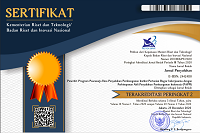POTENSI MASYARAKAT DAN KELEMBAGAAN LOKAL DALAM PEMBERDAYAAN KELUARGA MISKIN DI PERDESAAN (STUDI KASUS KABUPATEN BONE)
Keywords:
Potency, local instituiton, poor family
Abstract
The aim of the research was intended to formulate the model of poor familiy Empowerement by determining both the level and the influencing factors of social responsibility and level of empowerment. Survey and interview techniques were implemented among 276 selected samples, started Nopember 2006 until April 2007. Data was analyzed by using both correlation and path analysis. The results indicated that a number of respondent had a high social responsibility and medium level of empowerment. The increase of social responsibility and level of empowerment were influenced by implementation of good government of local organization, income, and formal education. This study suggests an alternative model of empowerment in order to social responsibility and level of empowerment.Downloads
Published
2008-03-01
How to Cite
BustangB., SugihenB. G., SlametM., & SusantoD. (2008). POTENSI MASYARAKAT DAN KELEMBAGAAN LOKAL DALAM PEMBERDAYAAN KELUARGA MISKIN DI PERDESAAN (STUDI KASUS KABUPATEN BONE). Jurnal Penyuluhan, 4(1). https://doi.org/10.25015/penyuluhan.v4i1.2167
Section
Articles
Authors who publish with this journal agree to the following terms:
- Authors retain copyright and grant the journal right of first publication with the work simultaneously licensed under a

This work is licensed under a Creative Commons Attribution 4.0 International License that allows others to share the work with an acknowledgement of the work's authorship and initial publication in this journal. - Authors are able to enter into separate, additional contractual arrangements for the non-exclusive distribution of the journal's published version of the work (e.g., post it to an institutional repository or publish it in a book), with an acknowledgement of its initial publication in this journal.
- Authors are permitted and encouraged to post their work online (e.g., in institutional repositories or on their website) prior to and during the submission process, as it can lead to productive exchanges, as well as earlier and greater citation of published work (See The Effect of Open Access).















